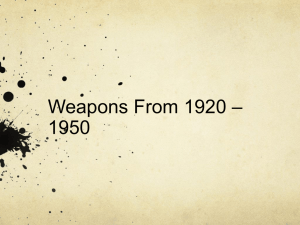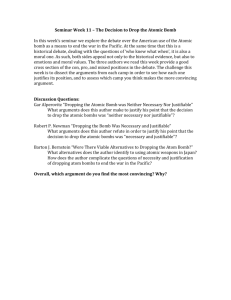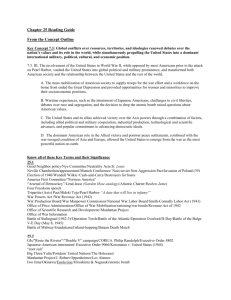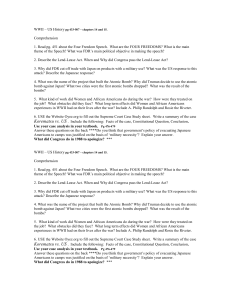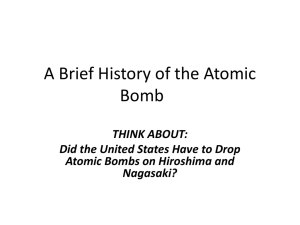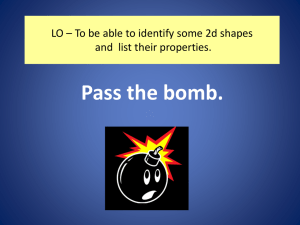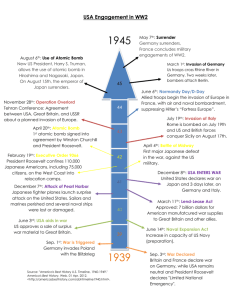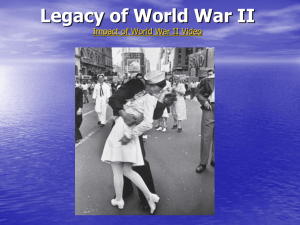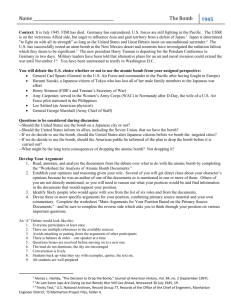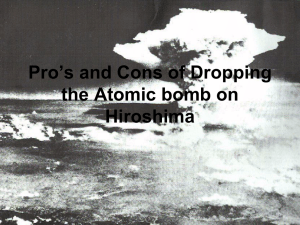Performance Task: Atomic Bomb
advertisement
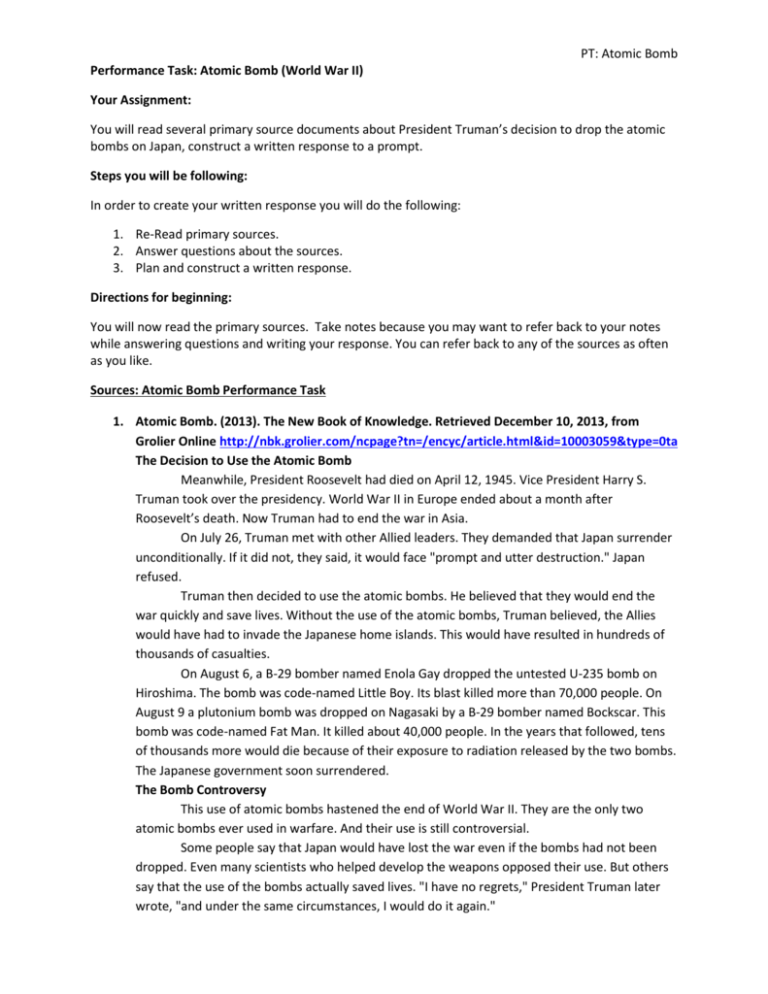
PT: Atomic Bomb Performance Task: Atomic Bomb (World War II) Your Assignment: You will read several primary source documents about President Truman’s decision to drop the atomic bombs on Japan, construct a written response to a prompt. Steps you will be following: In order to create your written response you will do the following: 1. Re-Read primary sources. 2. Answer questions about the sources. 3. Plan and construct a written response. Directions for beginning: You will now read the primary sources. Take notes because you may want to refer back to your notes while answering questions and writing your response. You can refer back to any of the sources as often as you like. Sources: Atomic Bomb Performance Task 1. Atomic Bomb. (2013). The New Book of Knowledge. Retrieved December 10, 2013, from Grolier Online http://nbk.grolier.com/ncpage?tn=/encyc/article.html&id=10003059&type=0ta The Decision to Use the Atomic Bomb Meanwhile, President Roosevelt had died on April 12, 1945. Vice President Harry S. Truman took over the presidency. World War II in Europe ended about a month after Roosevelt’s death. Now Truman had to end the war in Asia. On July 26, Truman met with other Allied leaders. They demanded that Japan surrender unconditionally. If it did not, they said, it would face "prompt and utter destruction." Japan refused. Truman then decided to use the atomic bombs. He believed that they would end the war quickly and save lives. Without the use of the atomic bombs, Truman believed, the Allies would have had to invade the Japanese home islands. This would have resulted in hundreds of thousands of casualties. On August 6, a B-29 bomber named Enola Gay dropped the untested U-235 bomb on Hiroshima. The bomb was code-named Little Boy. Its blast killed more than 70,000 people. On August 9 a plutonium bomb was dropped on Nagasaki by a B-29 bomber named Bockscar. This bomb was code-named Fat Man. It killed about 40,000 people. In the years that followed, tens of thousands more would die because of their exposure to radiation released by the two bombs. The Japanese government soon surrendered. The Bomb Controversy This use of atomic bombs hastened the end of World War II. They are the only two atomic bombs ever used in warfare. And their use is still controversial. Some people say that Japan would have lost the war even if the bombs had not been dropped. Even many scientists who helped develop the weapons opposed their use. But others say that the use of the bombs actually saved lives. "I have no regrets," President Truman later wrote, "and under the same circumstances, I would do it again." PT: Atomic Bomb 2. Leaflets dropped on cities in Japan warning civilians about the atomic bomb, dropped c. August 6, 1945 http://www.pbs.org/wgbh/americanexperience/features/primary-resources/trumanleaflets/ Leaflets dropped on cities in Japan warning civilians about the atomic bomb, dropped c. August 6, 1945 TO THE JAPANESE PEOPLE: America asks that you take immediate heed of what we say on this leaflet. We are in possession of the most destructive explosive ever devised by man. A single one of our newly developed atomic bombs is actually the equivalent in explosive power to what 2000 of our giant B-29s can carry on a single mission. This awful fact is one for you to ponder and we solemnly assure you it is grimly accurate. We have just begun to use this weapon against your homeland. If you still have any doubt, make inquiry as to what happened to Hiroshima when just one atomic bomb fell on that city. Before using this bomb to destroy every resource of the military by which they are prolonging this useless war, we ask that you now petition the Emperor to end the war. Our president has outlined for you the thirteen consequences of an honorable surrender. We urge that you accept these consequences and begin the work of building a new, better and peace-loving Japan. You should take steps now to cease military resistance. Otherwise, we shall resolutely employ this bomb and all our other superior weapons to promptly and forcefully end the war. EVACUATE YOUR CITIES. ATTENTION JAPANESE PEOPLE. EVACUATE YOUR CITIES. Because your military leaders have rejected the thirteen part surrender declaration, two momentous events have occurred in the last few days. The Soviet Union, because of this rejection on the part of the military has notified your Ambassador Sato that it has declared war on your nation. Thus, all powerful countries of the world are now at war with you. Also, because of your leaders' refusal to accept the surrender declaration that would enable Japan to honorably end this useless war, we have employed our atomic bomb. A single one of our newly developed atomic bombs is actually the equivalent in explosive power to what 2000 of our giant B-29s could have carried on a single mission. Radio Tokyo has told you that with the first use of this weapon of total destruction, Hiroshima was virtually destroyed. Before we use this bomb again and again to destroy every resource of the military by which they are prolonging this useless war, petition the emperor now to end the war. Our president has outlined for you the thirteen consequences of an honorable surrender. We urge that you accept these consequences and begin the work of building a new, better, and peace-loving Japan. Act at once or we shall resolutely employ this bomb and all our other superior weapons to promptly and forcefully end the war. EVACUATE YOUR CITIES. 3. PT: Atomic Bomb “The Destruction of Hiroshima and Nagasaki” (Jack Daw Portfolio: Michael O’Niel) a. As the Enola Gay approached its target-Hiroshima- air raid sirens went off throughout the city. The sirens had sounded earlier that morning, but nothing happened, so most of the city’s residents ignored this new warning. Minutes later, however, those who were out of doors saw a parachute quietly drifting toward the earth; this was cause for a moment of satisfaction, for parachutes were usually a sign that an American plane had been hit by antiaircraft fire and that the pilot was parachuting to safety. -Most of these people never had a chance to learn that dangling from the end of the parachute was an atomic bomb. -At 8:16, at an altitude of just under two thousand feet, the bomb detonated. With an explosive force of over 25 million pounds of dynamite, the blast reduced the city to a pile of burning rubble in moments. A four-square-mile area around “ground zero,” the center of the explosion, was utterly destroyed. The heat from the bomb’s blast was so intense—as high as 7,200 degrees at ground zero—that fires sprang up as far as two miles away. This heat carried ash and soot miles into the sky, creating the mushroom cloud characteristic of atomic explosions. By nightfall, much of the ash and debris was falling back on the city in the form of “black rain.” -The initial blast killed about 80,000 people; another 100,000 were seriously injured, most of those badly burned. Thousands of dazed survivors wandered about the city, looking for loved ones and seeking nonexistent medical help for their injuries. In the days, months, and even years that followed, thousands more died from the effects of the bomb’s radioactivity. The overwhelming sense of loss and despair among the survivors led many to conclude that the lucky ones were those who were killed instantly by the blast. 4. A Petition to the President of the United States (Paragraph 8) July 17, 1945 Atomic Scientists In view of the foregoing, we, the undersigned, respectfully petition: first, that you exercise your power as commander-in-Chief, to rule that the United States shall not resort to the use of atomic bombs in this war unless the terms which will be imposed upon Japan have been made public in detail and Japan knowing these terms has refused to surrender; second, that in such an event the question whether or not to use atomic bombs be decided by you in the light of the considerations presented in this petition as well as all the other moral responsibilities which are involved. PT: Atomic Bomb 5. “Letter to the President, Harry S. Truman” August 9, 1945 Samuel McCrea Cavert General Secretary( Federal council of the churches of Christ in America) NEWYORK NY AUG 9 1945 1046A HONORABLE HARRY S TRUMAN PRESIDENT OF THE UNITED STATES THE WHITE HOUSE MANY CHRISTIANS DEEPLY DISTURBED OVER THE USE OF ATOMIC BOMBS AGAINST JAPANESE CITIES BECAUSE OF THEIR NECESSARILY INDISCRIMINATE DESTRUCTIVE EFFORTS AND BECAUSE THEIR USE SETS EXTREMELY DANGEROUS PRECEDENT FOR FUTURE OF MANKIND. BISHOP OXNAM PRESIDENT OF THE COUNCIL AND JOHN FOSTER DULES [sic; "Dulles"] SHAIRMAN [sic; "Chairman"] OF ITS COMMISSION ON A JUST AND DURABLE PEACE ARE PREPARING STATEMENT FOR PROBABLE RELEASE TOMORROW URGING THAT ATOMIC BOMBS BE REGARDED AS TRUST FOR HUMANITY AND THAT JAPANESE NATION BE GIVEN GENUINE OPPORTUNITY AND TIME TO VERIFY FACTS ABOUT NEW BOMB AND TO ACCEPT SURRENDER TERMS. RESPECTIFULLY URGE THAT AMPLE OPPORTUNITY BE GIVEN JAPAN TO RECONSIDER ULTIMATUM BEFORE ANY FURTHER DEVASTATION BY ATOMIC BOMB IS VISITED UPON HER PEOPLE FEDERAL COUNCIL OF THE CHURCHES OF CHRIST IN AMERICAN SAMUEL MCCREA CAVERT GENERAL SECRETAR 6. “Letter to Mr. Samuel McCrea Cavert” August 11, 1945 Harry S. Truman (President of the United States) August 11, 1945 My dear Mr. Cavert: I appreciated very much your telegram of August ninth. Nobody is more disturbed over the use of Atomic bombs than I am but I was greatly disturbed over the unwarranted attack by the Japanese on Pearl Harbor and their murder of our prisoners of war. The only language they seem to understand is the one we have been using to bombard them. When you have to deal with a beast you have to treat him as a beast. It is most regrettable but nevertheless true. Sincerely yours, HARRY S. TRUMAN PT: Atomic Bomb 7. “Immediate Release” Harry S. Truman. 1958 http://www.nuclearfiles.org/menu/library/correspondence/trumanharry/corr_truman_1958-03-12.htm Dear Mr. Chairman: ...After a long conference with the Cabinet, the military commanders and Prime Minister Churchill, it was decided to drop the atomic bomb on two Japanese cities devoted to war and work for Japan. The two cities selected were Hiroshima and Nagasaki. When Japan surrendered a few days after the bomb was ordered dropped, on August 6, 1945, the military estimated that at least a quarter of a million of the invasion forces against Japan and a quarter of a million Japanese had been spared complete destruction and that twice that many on each side would, otherwise, have been maimed for life. As the executive who ordered the dropping of the bomb, I think the sacrifice of Hiroshima and Nagasaki was urgent and necessary for the prospective welfare of both Japan and the Allies. The need for such a fateful decision, of course, never would have arisen, had we not been shot in the back by Japan at Pearl Harbor in December, 1941. And in spite of that shot in the back, this country of ours, the United States of America, has been willing to help in every way the restoration of Japan as a great and prosperous nation. Sincerely yours, Harry S. Truman PT: Atomic Bomb In favor of dropping the bomb Or Against dropping the bomb Reasons for Or Reasons against Moral issues of right and wrong, fairness, etc. Pro Con Quote or paraphrase from text (cite paragraph #). Then explain what the quote says is important Quote or paraphrase from text (cite paragraph #). Then explain what the quote says is important PT: Atomic Bomb PROMPT: Using the documents students must answer the following question. Your answer will be scored. Please reference the documents and annotations as you answer the questions. Discuss the issues Harry Truman considered in deciding to drop the Atomic Bombs, evaluate whether he was right or wrong? PT: Atomic Bomb 4 Statement of Purpose/Focus -Claim is clearly stated, focused and strongly maintained -Alternate or opposing claims are clearly addressed -Claim is introduced and communicated clearly within the context 3 -Claim is clear and for the most part maintained, though some loosely related material may be present -Context provided for the claim is adequate 2 -May be clearly focused on the claim but is insufficiently sustained -Claim on the issue may be somewhat unclear and unfocused 1 -may be very brief -may have a major drift -claim may be confusing or ambiguous Organization -Effective, consistent use of a variety of transitional strategies. -Logical progression of ideas from beginning to end. -Effective introduction and conclusion for audience and purpose -Strong connections among ideas, with some syntactic variety -Some evidence from sources is integrated, though citations may be general or imprecise -Inconsistent use of basic transitional strategies with little variety -Uneven progression of ideas from beginning to end -Conclusion and introduction, if present, are weak -Weak connection among ideas -Few or no transitional strategies are evident -Frequent extraneous ideas Elaboration of Evidence -Use of evidence from sources is smoothly integrated, comprehensive, relevant, and concrete -Effective use of a variety of elaborative techniques Language and Vocabulary -Use of evidence from sources is smoothly integrated, comprehensive, relevant, and concrete -Effective use of a variety of elaborative techniques -Some evidence from sources is integrated, though citations may be general or imprecise -Adequate use of some elaborative techniques -Use of domainspecific vocabulary is generally appropriate for the audience and purpose -Evidence from sources is weakly integrated, and -citations, if present are uneven -weak or uneven use of elaborative techniques -Use of evidence from sources is minimal, absent, in error, or irrelevant Conventions -Few, if any, errors are present in usage and sentence formation; -Effective and consistent use of punctuation, capitalization, and spelling -Some errors in usage and sentence formation may be present, but no systematic pattern of errors is displayed; -Adequate use of punctuation, capitalization, and spelling -Use of domain -Frequent specific errors in vocabulary may usage may at times be obscure inappropriate for meaning the audience and -Inconsistent purpose use of punctuation, capitalization, and spelling -Uses limited language or domain-specific vocabulary -May have little sense of audiencepurpose -Errors are frequent and severe and -Meaning is often obscure Content PT: Atomic Bomb
